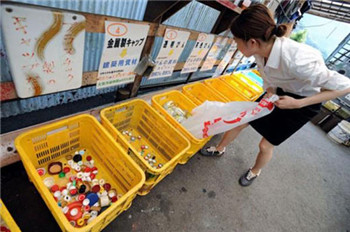(单词翻译:单击)

We’ve heard many stories of individuals across the world who’ve adopted a zero-waste lifestyle, but it’s not often that we come across an entire community that is trying to become waste-free. The residents of Kamikatsu, Japan, take recycling so seriously that they actually hope to become the nation’s first zero-waste community by 2020.
采取“零废物”生活方式的个人屡见不鲜,力图实现“无废弃”目标的群体倒很少见。日本上勝町的居民在回收利用废物时相当严谨,事实上,他们希望到2020年时,能把家乡建设成日本首个“零废物”小镇。
Kamikatsu has no garbage trucks – so residents need to compost their kitchen scraps at home. They also have to wash and sort the rest of their trash into 34 different categories, and bring it to the recycling center themselves where workers make sure that the waste goes into the correct bins. It apparently took some time for the residents to get used to this rule, but they eventually managed to adapt to the drastic changes and are now seeing them as normal.
上勝町没有垃圾车——因而居民需要在家中将厨余垃圾制成堆肥。除此之外,他们必须先清洗废物,并对照34种分类标准一一归类,然后再将其送至回收中心,那里的工人会确保废物被正确放入相应的回收箱。显然,适应回收规则需要时间,但上勝町的居民最终成功适应了这些巨变,并渐渐变得习以为常。
The Japanese town has turned recycling into a streamlined process – there are separate bins for different types of paper products – newspapers, magazines, cartons, and flyers. Even plastic bottles and their caps go into different bins as do aluminum, spray, and steel cans are collected separately too. Many of these items are resold or repurposed into usable clothing, toys, and accessories. The labels on each bin show the recycling process for that specific item, so the residents know exactly what happens to their trash.
这个日本小镇让回收过程变得既精简又高效——上勝町针对各类纸制品(譬如报纸、杂志、纸箱及传单)设置了不同的回收箱。甚至连塑料瓶和瓶盖都必须分开投放,铝罐、喷雾罐和钢罐也必须归类至不同的回收箱。人们会再次出售某些废物,或将其重新用于衣物、玩具和首饰上。每个回收箱都贴有展示此类废物回收过程的标签,这样,居民们就能清楚得知废物的处理方式。
Reuse is highly encouraged in Kamikatsu – they have a local kuru-kuru shop where residents can exchange used items with new things at no extra cost. And the kuru-kuru factory employs women to make bags, clothes, and stuffed dolls out of discarded items. Businesses are also encouraged to participate in responsible waste management – the town has a zero-waste brewery, housed in a building constructed of reused materials.
上勝町特别鼓励居民重复使用物品——当地设有kuru-kuru商店,人们可以以旧换新,而无需支付额外费用。kuru-kuru工厂会雇佣女工用废弃物品制作包包、衣物或填充玩偶。上勝町支持各类企业参与废物管理以增强企业的责任感——小镇里有一家“零废物”酿酒厂,它位于采用可再生材料建造的房屋内。
With a population of just over 1,700, Kamikatsu recycles about 80 percent of its trash and only 20 percent goes to landfills, so you could say that the town is very close to achieving its goal. They’ve been practicing prudent waste management for the past 13 years after declaring their zero-waste ambition in 2003 and giving up their old practice of dumping trash into open fires.
小镇仅有1700多人,却回收了近八成的废物,需要运至垃圾填筑地的废物只剩两成,从某种程度上来说,小镇已快要达成“零废物”的目标。2003年时,上勝町宣称要实现此目标,他们放弃了焚烧垃圾的旧做法。此后的13年里,他们始终严格践行废物管理规则。
“If you get used to it, it becomes normal,” a Kamikatsu resident said in a video made by YouTube channel Seeker Stories. “It can be a pain, and at first we were opposed to the idea. Now I don’t think about it. It’s become natural to separate the trash correctly.”
“当你习惯回收废物后,这事儿就会显得很平常,”在YouTube“探索者所见” (Seeker Stories)频道摄制的录像中,一位上勝町的居民如是说道。“回收废物很麻烦,我们起初都反对这一提议。但现在,我根本不会想太多。对我来说,正确分类废物再自然不过了。”
All the recycling facilities in Kamikatsu are managed by a Zero Waste Academy which also regularly hosts groups of local schoolchildren and foreign visitors, educating them on the benefits of a zero waste lifestyle. Every years, the Academy receives around 2,500 visitors from all around the world, all eager to learn more about zero-waste and how Kamikatsu has managed to implement its principles in such a short period of time.
上勝町所有的回收厂都归零废物协会管理,该协会还定期组织当地小学生及外国游客参观学习,教导他们采取“零废物”生活方式的益处。每年,协会都会接待2500多人到访,这些来自世界各地的人渴望能更多地了解“零废物”,同时也迫切想知道上勝町在短时间内成功践行废物管理规则的秘诀。


